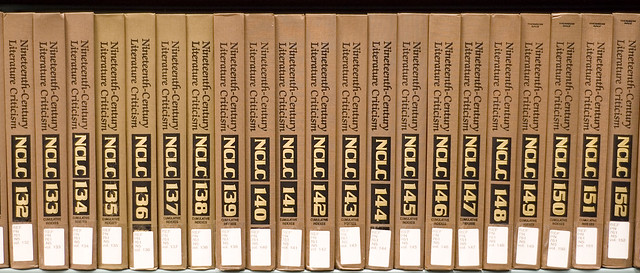
 Browse in the
Browse in the
 American Writers ; A Collection of Literary Biographies, 4 main volumes and 18 supplements
American Writers ; A Collection of Literary Biographies, 4 main volumes and 18 supplements
 Oxford Encyclopedia of American Literature, 4 volumes
Oxford Encyclopedia of American Literature, 4 volumes
Questions about how to use ProQuest? Take a look at these Helpful Videos.
Here's what to look for:
| CRITERIA | POPULAR MAGAZINE | TRADE JOURNAL | SCHOLARLY JOURNAL |
|
|
|
||
| Content | Secondary discussion of someone else's research; may include personal narrative or opinion; general information, purpose is to entertain or inform. | Current news, trends and products in a specific industry; practical information for professionals working in the field or industry. | In-depth, primary account of original findings written by the researcher(s); very specific information, with the goal of scholarly communication. |
| Author | Author is frequently a journalist paid to write articles, may or may not have subject expertise. | Author is usually a professional in the field, sometimes a journalist with subject expertise. | Author's credentials are provided; usually a scholar or specialist with subject expertise. |
| Audience | General public; the interested non-specialist. | Professionals in the field; the interested non-specialist. | Scholars, researchers, and students. |
| Language | Vocabulary in general usage; easily understandable to most readers. | Specialized terminology or jargon of the field, but not as technical as a scholarly journal. | Specialized terminology or jargon of the field; requires expertise in subject area. |
| Graphics | Graphs, charts and tables; lots of glossy advertisements and photographs. | Photographs; some graphics and charts; advertisements targeted to professionals in the field. | Graphs, charts, and tables; very few advertisements and photographs. |
| Layout & Organization | Informal; may include non-standard formatting. May not present supporting evidence or a conclusion. | Informal; articles organized like a journal or a newsletter. Evidence drawn from personal experience or common knowledge. | Structured; includes the article abstract, goals and objectives, methodology, results (evidence), discussion, conclusion, and bibliography. |
| Accountability | Articles are evaluated by editorial staff, not experts in the field; edited for format and style. | Articles are evaluated by editorial staff who may be experts in the field, not peer-reviewed*; edited for format and style. | Articles are evaluated by peer-reviewers* or referees who are experts in the field; edited for content, format, and style. |
| References | Rare. Little, if any, information about source materials is given. | Occasional brief bibliographies, but not required. | Required. Quotes and facts are verifiable. |
| Paging | Each issue begins with page 1. | Each issue generally begins with page 1. | Page numbers are generally consecutive throughout the volume. |
Periodical publications such as magazines, newspapers and journals vary in quality and depth of coverage. Instructors will frequently want you to select articles from scholarly journals (sometimes called "refereed" or "peer-reviewed" journals, though the terms don't mean exactly the same thing).
Click the image below to watch a short (3min) video on how to tell the difference between scholarly articles and popular magazine articles.
For more detail, try our guide:
Chat service is available from Monday at 8am until Friday at 5pm
Saturdays & Sundays 8am - Midnight
No chat service on holidays.
Truncation allows you to search variables of a word by typing part of the word plus an asterisk *
ADOPT finds just adopt, but ADOPT* finds adopted, adopting, adoptions, etc.
WOMAN finds just woman, but WOM*N finds woman and women.
Enclose your words in quotation marks to create a phrase search.
CHILDREN OF MEN finds 90 titles with some combination of those words
"CHILDREN OF MEN" finds only the book and movie with that exact title.
Student evaluation data is used to improve our instruction and support resources such as online research guides. Please give us your feedback.
